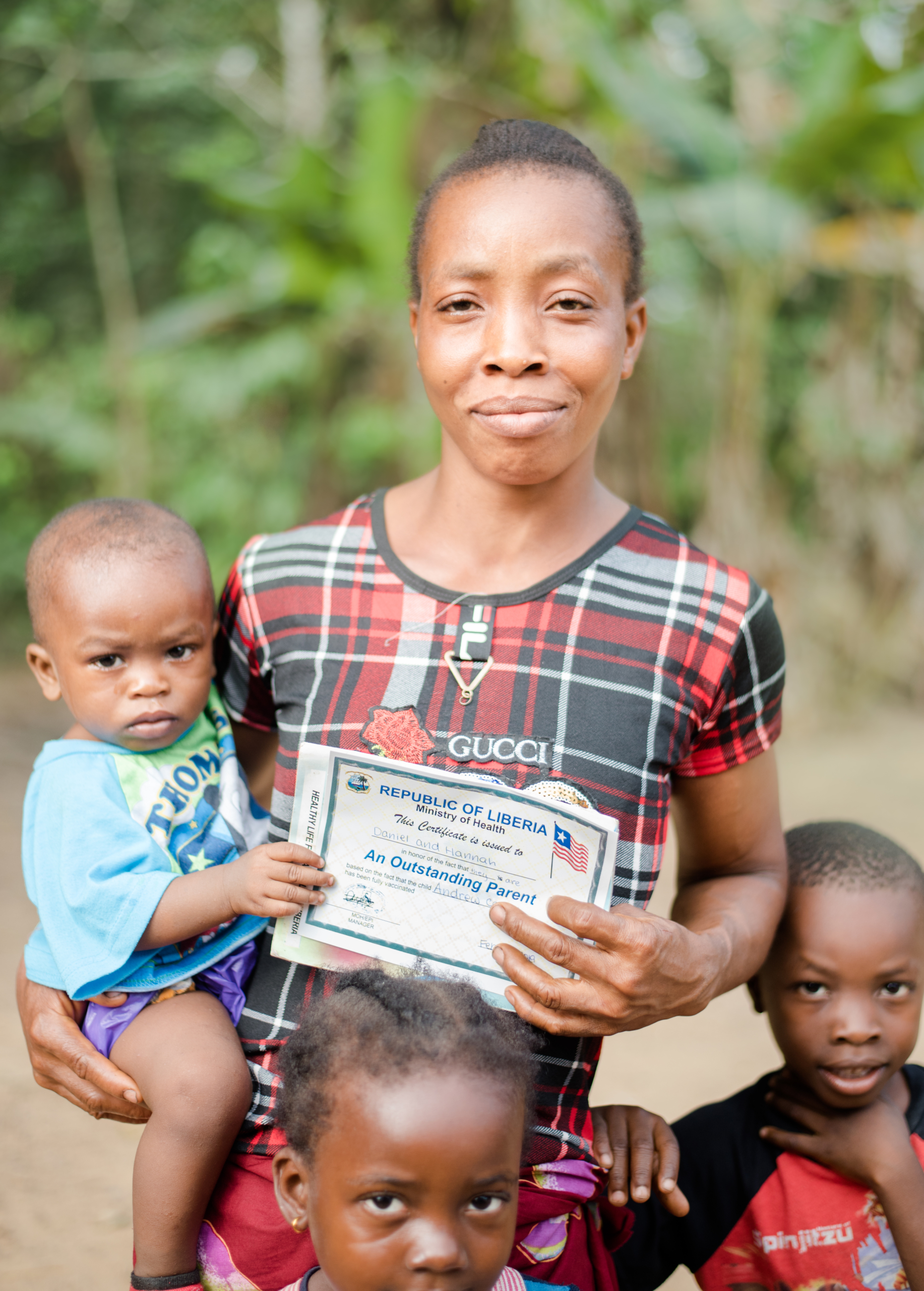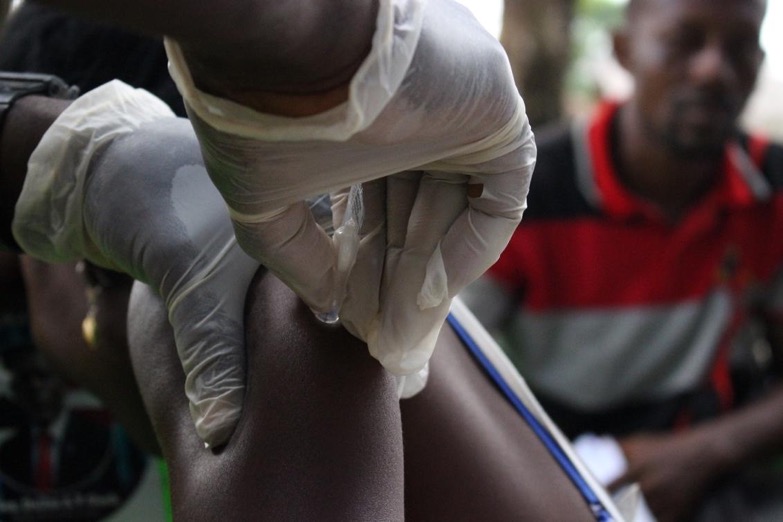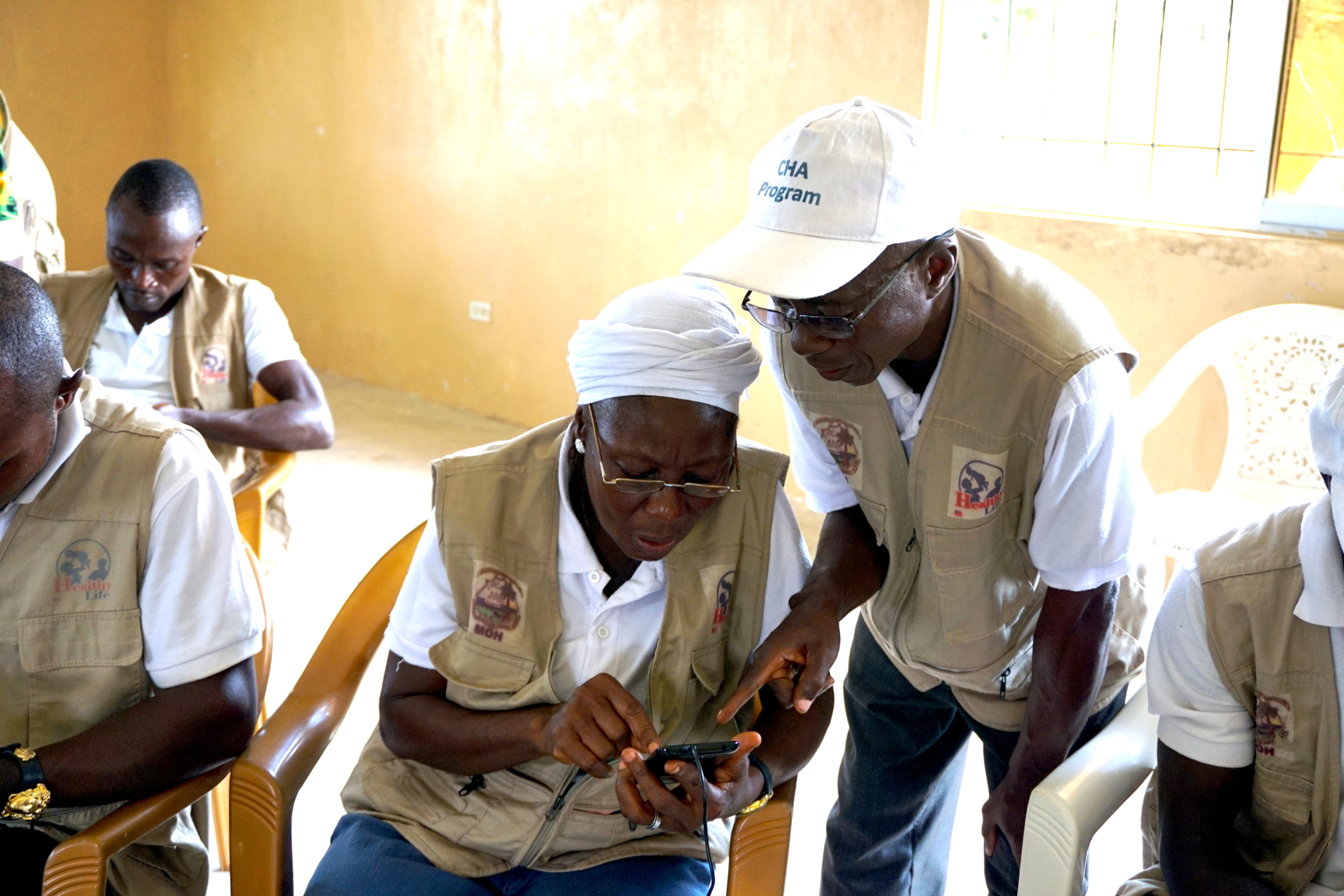Last Mile Health is partnering with the Liberia Ministry of Health to design bold, scalable innovations that advance the scope and quality of services available via the National Community Health Assistant Program. These innovations are designed to address the most pressing challenges facing health workers and the patients they serve, laying the groundwork for Liberia’s health system to continue to achieve transformative improvements in health access and quality of care.
Re-thinking Immunization Models for the Hardest-to-Reach

Andrew’s mother, Hannah, receives an “Outstanding Parent” award for completing his childhood vaccines.
Despite encouraging improvements in access to vaccinations worldwide, 19.9 million children worldwide still do not have access to a full course of the most basic vaccines – with children living in the poorest households and in the hardest-to-reach locations still the least likely to be vaccinated. In partnership with the Liberia Ministry of Health, Gavi, the Vaccine Alliance, and the Audacious Project, Last Mile Health is leveraging the role of community health workers to drive improvements in immunization coverage by deploying the following three strategies:
- Service delivery directly in remote communities: Vaccine outreach through community health workers supervisors twice a month
- Demand generation: Through routine household visits and health education provided by the community health workers
- Data collection: Vaccination tracking by community health workers and their supervisors
This innovative model of community-based immunization promises to improve coverage, decrease cost, and establish a replicable model for Liberia’s underserved communities and other community health programs. The goal of this partnership is to achieve immunization coverage rates of at least 90% in remote communities in Rivercess as a proof point for what can be achieved across the country.
Digital Health Deployment in Liberia
This past quarter, Last Mile Health rolled out digital tools across Liberia’s National Community Health Assistant Program to over 2,200 community health workers and supervisors – equipped with an e-learning platform and data collection tools. The digital health program’s immediate focus areas are threefold:
Put quality digital content into the hands of frontline health workers: In contrast to the limitations of one-off, classroom-based training, digital health tools provide around-the-clock access to engaging training and reference materials that enable community health workers to strengthen their diagnostic and treatment skills without leaving their communities. Through the provision of multimedia clinical content on offline-compatible mobile devices, these tools improve community health worker’s self-directed learning and keep their knowledge relevant and up-to-date.
Digitize national reporting systems for community health: Digitization of Liberia’s community-based information system will improve the Ministry of Health’s access to community-level data and the ability to make real-time decisions to strengthen the program.
Digitize the national training curriculum and support the continued deployment of a Ministry-led digital health initiative to reach all 4,000 community health workers across Liberia with devices by the end of 2019. Liberia is demonstrating how digital health can be leveraged as a means of boosting health worker knowledge and skills, optimizing performance, and ultimately improving the quality of healthcare for 1.2 million people living in the country’s most remote communities.
This past quarter, we worked with the National Digital Health Program to deploy over 2,200 digital health-enabled mobile devices to community health workers and clinical supervisors across six counties, a nearly 700% increase in digitally-empowered frontline health workers. In the coming months, we will work with the Ministry of Health to expand digital curriculum content, and support the continued deployment of a Ministry-led digital health initiative to reach all 4,000 community health workers across Liberia with devices by the end of 2019. Liberia is demonstrating how digital health can be leveraged as a means of boosting knowledge, optimizing performance, and ultimately improving the quality of healthcare for 1.2 million people living in the country’s most remote communities.
The importance of this body of work is underscored by the launch of the World Health Organization’s first digital health guidelines. As the World Health Organization Director Dr. Tedros Adhanom Ghebreyesus says, “Harnessing the power of digital technologies is essential for achieving universal health coverage.” Last Mile Health looks forward to continuing to work with partners across Liberia and beyond to strengthen digital health work in order to advance the health for all movement.
Expanding Access to Family Planning Options at the Last Mile

A patient in Rivercess County, Liberia receives a dose of Sayana Press from a community health worker.
For many women living in Liberia’s remote communities, accessing a preferred method of family planning as part of comprehensive sexual and reproductive health remains out-of-reach. This is now changing in Rivercess County due to a partnership with the Liberia Ministry of Health, United Nations Population Fund, and Last Mile Health to train community health workers to administer a low-dose, injectable form of family planning called Sayana Press to women in their communities. Sayana Press, which is manufactured by Pfizer Inc, uses a pre-filled, disposable injection system to provide three months of contraceptive protection in a single injection. Through this initiative, women now have access to an additional family planning option that can be delivered in the comfort, privacy, and convenience of their own home, which means they no longer need to travel to a clinic to receive injectable forms of contraception.
The pilot will train community health workers to bring Sayana Press to an anticipated 2,000 women of childbearing age in Rivercess County over the next year. By targeting the county’s hardest-to-reach communities, the project will help to generate evidence about the uptake of injectable contraceptive methods in rural communities and inform planning for the inclusion of Sayana Press within the basic community health worker service delivery package nationwide.





